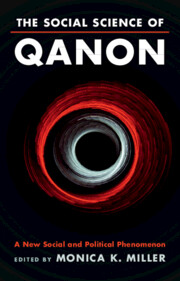Book contents
- The Social Science of QAnon
- The Social Science of QAnon
- Copyright page
- Dedication
- Contents
- Contributors
- Preface
- Part I Introduction to QAnon
- Part II Recruiting and Maintaining Followers
- Part III QAnon and Society
- Part IV The Role of Communication in Promoting and Limiting QAnon Support
- Chapter 12 QAnon and Social Media
- Chapter 13 Social Network Analysis Techniques Using NodeXL for Analyzing Disinformation Related to QAnon
- Chapter 14 QAnon, Folklore, and Conspiratorial Consensus
- Chapter 15 Debunking and Preventing Conspiracies
- Part V The Future of QAnon
- Index
- References
Chapter 15 - Debunking and Preventing Conspiracies
Special Challenges of QAnon
from Part IV - The Role of Communication in Promoting and Limiting QAnon Support
Published online by Cambridge University Press: 14 September 2023
- The Social Science of QAnon
- The Social Science of QAnon
- Copyright page
- Dedication
- Contents
- Contributors
- Preface
- Part I Introduction to QAnon
- Part II Recruiting and Maintaining Followers
- Part III QAnon and Society
- Part IV The Role of Communication in Promoting and Limiting QAnon Support
- Chapter 12 QAnon and Social Media
- Chapter 13 Social Network Analysis Techniques Using NodeXL for Analyzing Disinformation Related to QAnon
- Chapter 14 QAnon, Folklore, and Conspiratorial Consensus
- Chapter 15 Debunking and Preventing Conspiracies
- Part V The Future of QAnon
- Index
- References
Summary
This chapter opens with a review of the dangers of misinformation and conspiracy theory beliefs. We then review the literature on debunking techniques, highlighting why debunking is largely ineffective at combatting QAnon and other conspiracy theories. Although corrections are largely ineffective, repeated corrections, warnings, and alternative accounts for misinformation can improve their effectiveness. In contrast to debunking, another approach is “prebunking”; trying to prevent conspiracies rather than counter them. Based on inoculation theory, Banas and Miller (2013) found that both fact-based and logic-based messages delivered before a conspiracy film helped build up participants’ resistance to that message. Next, this chapter discusses the role of media literacy in the QAnon—and other more general—conspiracies. Research has indicated that greater news media literacy relates negatively to beliefs in conspiracies (Craft et al., 2017). A brief discussion of how QAnon is similar or different from other groups is offered, along with some research questions for future study about QAnon specifically.
- Type
- Chapter
- Information
- The Social Science of QAnonA New Social and Political Phenomenon, pp. 252 - 268Publisher: Cambridge University PressPrint publication year: 2023
References
- 2
- Cited by

